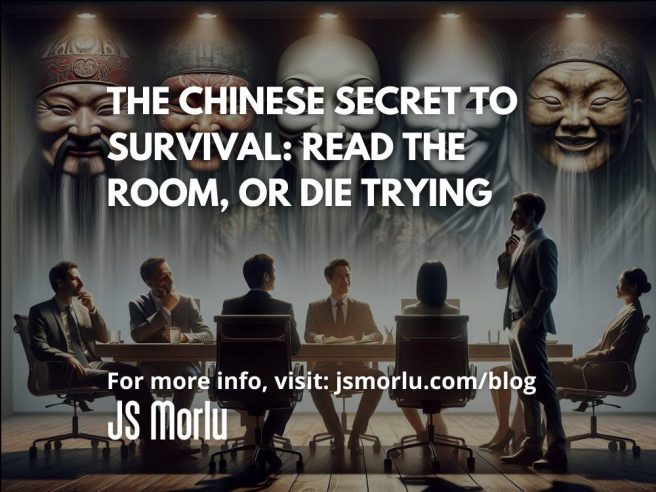By: John S. Morlu II, CPA
In Chinese, there’s a saying that everyone has a look and an identity — and if you can’t figure these out quickly, you’re dead on arrival professionally. It sounds poetic, almost harmless, until you realize it’s not a proverb — it’s a warning label for life. It’s the distilled wisdom of centuries of observation in a society where survival often depended less on strength and more on perception.
China, after all, was an empire of courtiers, scholars, and tacticians — not brawlers. In a culture that produced Confucius, Sun Tzu, and Machiavelli’s spiritual twin, Han Feizi, “reading the room” wasn’t a soft skill — it was the difference between keeping your head and losing it. The old proverb isn’t about judgment — it’s about navigation. If you can’t quickly read people — their intentions, loyalties, insecurities, and masks — you’ll end up wandering blind in a room full of chess masters.
Because here’s the brutal truth: in every organization, from imperial court to corporate boardroom, people don’t get eaten by tigers. They get eaten by people who smile like friends.
The Meaning Beneath the Smile
Every person you meet carries a look — not just a physical face, but a social mask. Their tone, walk, humor, and silence all reveal something. And if you can’t interpret that fast, you’ll misread everything that follows.
That “friendly” colleague who compliments you before meetings? She’s benchmarking your weaknesses. The boss who keeps saying, “You’re doing great”? Translation: “You’re not a threat — yet.” The intern who rarely speaks might be quietly observing everyone, learning which senior is insecure, and preparing to bypass three layers of management by the end of next year.
The Chinese saying reminds you: don’t just hear what people say — see what they mean. Because in life and business, communication is 90% theater, 9% tone, and 1% truth accidentally escaping.
Machiavelli Would Approve
Machiavelli, the Renaissance’s favorite realist, would’ve adored this proverb. He said rulers must learn to judge by the eye, not the ear. People, he observed, “are so simple and so subject to present necessities that he who deceives will always find someone who will let himself be deceived.”
In other words — if you don’t read people fast, you’ll be their next lesson plan.
Imagine Machiavelli at a corporate meeting today. The PowerPoint is endless. The VP is speaking in acronyms no one understands. But Machiavelli is silent, taking mental notes: who’s trying too hard, who’s nodding excessively, who’s pretending to agree while secretly undermining. Within minutes, he knows everyone’s ambition, fear, and weak spot.
That’s the art. And if you think it’s manipulative, you’ve already lost the promotion.
Fun Facts: The Science and Art of First Impressions
1. Fact 1: Your Brain Is a Human Scanner.
Princeton researchers found that we make judgments about people’s trustworthiness and competence in 100 milliseconds — less time than it takes to blink. Evolution wired us to size up strangers instantly, because back in the caves, hesitation got you eaten. Today, it just gets you ignored in meetings.
2. Fact 2: The Ancient Chinese Used Face Reading as HR Policy.
The imperial government actually employed physiognomists to help assess potential civil servants. Wide foreheads meant vision and strategy. Big ears meant longevity and wisdom. A downward mouth was bad — pessimism. (Imagine being rejected from a job because of your lips.)
3. Fact 3: The “Thin-Slice” Effect.
Psychologists call it the thin-slice effect — our ability to make accurate judgments from brief observations. The best leaders, negotiators, and interrogators all rely on it. But like ancient Chinese sages, they know to never reveal it.
The Professional Battlefield
Modern workplaces are simply Confucian courts in business suits. The same rules apply: power is delicate, hierarchy is hidden, and perception is survival. The person who reads people quickly — and accurately — always wins.
Let’s be honest: organizations don’t reward truth-tellers; they reward interpreters.
- The intern who knows which manager’s ego to flatter will rise faster than the genius who blurts out facts.
- The accountant who senses the client’s insecurity about “control” will close the deal with a smile, not a spreadsheet.
- The executive who knows when to pretend not to notice incompetence will keep alliances that later save his job.
Fail to read the players, and you’ll find yourself saying things like:
“I don’t understand why I didn’t get promoted.”
Or worse:
“I thought they liked me.”
That’s when the proverb hits like cold tea — you were dead before the meeting even started.
The Satirical Truth
Let’s face it — modern offices are soap operas with Wi-Fi.
You’ve got:
- The Drama Queen (cries during every deadline).
- The Phantom (no one knows what he does but his calendar’s always “full”).
- The Politician (never wrong, never accountable).
- The Sufferer (burnt out since 2017 and proud of it).
If you can’t spot who’s who by the second coffee break, you’ll spend years playing emotional ping-pong while others quietly climb the ladder.
In ancient Chinese courts, failing to recognize the emperor’s favorites meant exile.
In modern companies, it means you’ll be “restructured” — the polite corporate word for execution.
The Paradox of Perception
Here’s the cosmic joke:
If you read people too fast, they call you manipulative.
If you read them too slow, they call you clueless.
If you read them perfectly — and keep quiet — they call you wise.
That’s why the best leaders don’t talk too much in meetings. They listen. They observe. They laugh at the right times. They give vague compliments that make everyone feel validated. They are, in essence, professional illusionists — masters of perception who understand that silence can be more strategic than intelligence.
The Chinese call this 留白 (liú bái) — the art of leaving blank space. It’s what painters, poets, and power players share: the discipline to hold back just enough to let others reveal themselves.
The Modern Takeaway
In today’s world — from boardrooms to Zoom calls to dating apps — the Chinese saying still reigns supreme. Everyone has a “look”: the startup founder with messianic confidence; the manager who mistakes busyness for leadership; the influencer with wisdom filtered through ring light.
Your task isn’t to judge — it’s to decode.
Because when you can’t tell sincerity from salesmanship, loyalty from laziness, or humility from strategy — you’re done.
The people who rise fast in life are rarely the smartest or the kindest — they’re the quickest to read intent. They know who’s ambitious, who’s insecure, who’s dangerous, and who’s simply pretending to care.
So yes — everyone has a look and an identity. But the world belongs to those who can see them clearly, quickly, and quietly.
“To see clearly is power.
To see slowly is death.
To see — but not reveal — is art.”
So the next time you enter a boardroom, a party, or a political negotiation, don’t just listen to what people say. Observe how they breathe before they say it. Watch who avoids eye contact when someone else speaks. Notice who performs agreement a little too eagerly.
That’s not paranoia — that’s professionalism.
Because as the proverb warns: in this world, if you can’t figure people out fast enough, you’re not just behind — you’re already finished.
Author: John S. Morlu II, CPA is the CEO and Chief Strategist of JS Morlu, leads a globally recognized public accounting and management consultancy firm. Under his visionary leadership, JS Morlu has become a pioneer in developing cutting-edge technologies across B2B, B2C, P2P, and B2G verticals. The firm’s groundbreaking innovations include AI-powered reconciliation software (ReckSoft.com) and advanced cloud accounting solutions (FinovatePro.com), setting new industry standards for efficiency, accuracy, and technological excellence.
JS Morlu LLC is a top-tier accounting firm based in Woodbridge, Virginia, with a team of highly experienced and qualified CPAs and business advisors. We are dedicated to providing comprehensive accounting, tax, and business advisory services to clients throughout the Washington, D.C. Metro Area and the surrounding regions. With over a decade of experience, we have cultivated a deep understanding of our clients’ needs and aspirations. We recognize that our clients seek more than just value-added accounting services; they seek a trusted partner who can guide them towards achieving their business goals and personal financial well-being.
Talk to us || What our clients says about us





